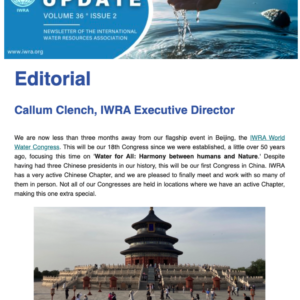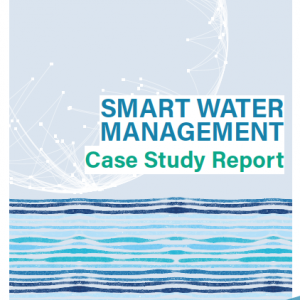Where are they now: An Interview with Georgina Mukwirimba, Former IWRA World Water Envoy
In our new series “Where Are They Now?” we had the pleasure of interviewing Georgina Mukwirimba, a former IWRA World Water Envoy from Zimbabwe, who was an Envoy at IWRA’s XVII World Water Congress in Daegu, South Korea, in 2021. Georgina shares insights from her time as an Envoy, her professional journey, and her current work in addressing global water challenges.
Could you tell us a bit about your experience as an IWRA World Water Envoy? What were some of the highlights?
Being an IWRA World Water Envoy was quite an interesting experience, especially given the long wait for the World Water Congress due to COVID. During that time, we had some great mentorship opportunities and to connect with other Envoys. My mentor, Henning Bjornlund (IWRA Vice President), was incredibly supportive. We had several meetings where we could discuss anything with our mentors and fellow Envoys. Henning helped me with recommendations, advised me on applications, and improved my personal statements. The mentorship programme was invaluable.
When we finally got to the Congress, it was amazing. Speaking in front of a huge crowd in South Korea was a fantastic experience. Traveling to a new country, meeting people like Jennifer Sara from the World Bank who inspires me, and making connections that opened up numerous opportunities was incredible. I got to speak on a big stage. It may me realise I can go anywhere.
The journey to the Congress and the event itself really opened doors for me, which led to further engagements like the World Water Forum in Senegal, which we were invited to attend at no expense. So, it was not just about the Congress. It was about the journey to and after.
What motivated you to become an IWRA World Water Envoy, and how did it shape your perspective on global water issues?
For me, the role of an Envoy was particularly interesting. Being an Envoy means being a voice for others, an advocate. I saw myself in that role because I love speaking, advocacy work, and public speaking about the things I’m passionate about. I always thought I was born to be a speaker, an Envoy, or a diplomat. I’m still finding my path, but this feels like the most interesting route for me.
When I learned about the Envoy role, I thought it matched perfectly with what I love to do. I was motivated by the opportunity to discuss important issues at the Congress. I envision myself in a future of diplomacy and advocacy, not just focusing on the technical aspects of my field. Though I studied engineering and am pursuing a master’s in water resources, policy, and management, I see myself working more in advocacy and diplomacy.
I was excited about the opportunity because the advertisement asked us to take pictures and tell stories about our communities. In Harare, Zimbabwe, there are so many stories to showcase, especially about water. Often, people in the developing world talk about water, but they might not truly understand the realities on the ground. I wanted to be the voice sharing these experiences firsthand rather than relying on outsiders who haven’t lived them.
My father supported me in this endeavour, suggesting places to take meaningful pictures. We often went together, and I would ask people for permission to speak with them or take their pictures. This whole experience was something I truly loved doing.
What have you been up to since your time as an IWRA World Water Envoy? Could you share some key projects or roles you’ve taken on?
When we had our World Water Congress, I had just graduated from my undergraduate programme. After graduation, I joined organisations like the United Nations Office for Project Services as a graduate engineer, working on water and sanitation projects. Specifically, I worked as a water and sanitation engineer in Chimanimani, a district in Zimbabwe, which had been heavily impacted by Cyclone Idai. The cyclone destroyed much of the water and sanitation infrastructure, and our project, funded by the World Bank, aimed to rehabilitate, reconstruct, and construct climate-resilient water and sanitation infrastructure.
The project involved not only rehabilitating existing infrastructure but also constructing new systems because many residents had been without tap water for years. We built new water supply systems, reservoirs, pipelines (both gravity and PVC), and other necessary infrastructure. The existing asbestos pipes, which are no longer recommended for water supply, were replaced with HDPE pipes that are stronger, more resilient, and safe for human consumption.
During this time, I also started applying for my master’s degree. Henning, who had been supportive throughout my journey as an IWRA World Water Envoy, helped me with my recommendation letters. I applied to several universities and received two scholarship offers: one from the University of Oxford for Water Science Policy and Management, and another from Oregon State University. It was a tough decision, and many people questioned why I chose Oregon State. However, after considering various advice and factors, I felt that Oregon State would best support my career aspirations.
How did your experience as an IWRA World Water Envoy influence your career trajectory? Are there any particular skills or insights you gained that have been particularly valuable?
When I attended the World Water Congress and spent time in that environment, I realised how incredibly complex the challenges in the water sector are. The solutions to these challenges must be found within the complex societies where these problems exist. I came to understand that solving water issues requires more than just an engineering approach; it needs an interdisciplinary strategy.
I recognised that addressing water problems effectively involves not only technical expertise but also a social perspective. This realisation led me to pursue a degree in “Water Resources Policy and Management” after completing my civil engineering studies. The challenges in the water sector are multifaceted and require input from various disciplines. The programme I’m enrolled in is interdisciplinary, drawing insights from multiple fields because the issues are not singular but multidimensional.
Engineering solutions often focus on achieving a technical outcome but may lack a holistic view that considers economics and ecosystems. It’s crucial to reflect on the Triple Bottom Line, which encompasses the three pillars of sustainability: people, planet, and economy. This understanding made me see that water issues are far more complex than they appear on the surface and require a new, integrated approach to address them effectively.
Other than that, it helped me work on my public speaking and networking skills.
What do you see as the most pressing water-related challenges today, and how do you think they can be address?
I have an initiative that I’m interested in, but it’s still in development, and kind of a secret. Most of our water problems today are caused by large corporations and agricultural firms, which are major consumers of water. These groups, along with private companies, are often not involved in the water dialogue. Additionally, policy makers and the general public, like your grandmother or sister who may not be interested in water issues, are usually not part of these discussions.
The water dialogues are often limited to water professionals talking to each other at conferences. This is a concern because talking amongst ourselves won’t bring about change. We need to engage those outside our field—businesses, corporations, the public, and policy makers. My goal is to find ways to get these groups interested in water issues.
Most people understand that water is essential for life but are unaware of the complexities of water issues. For instance, many people don’t realise that ocean water is saltwater and requires desalination. Policy makers are often out of the loop when scientific research is conducted, resulting in a disconnect between research and policy.
I want to create initiatives that capture the attention of these key groups. The major pressing issue is that we are not reaching the people who can make real change. If corporations become better stewards of water, things will improve significantly. We must foster water stewardship among everyone, not just those in the water sector. This includes corporations, the public, and policy makers. When they become water stewards, they will be more invested in protecting water resources.
Looking back, what was one of the most impactful moments or lessons learned from your time with IWRA?
I learned to just try things and not be discouraged by the odds. Even if only four or five out of 800 people are selected, aim for it because you never know what opportunities might come your way. If your applications aren’t working, reflect and strategise on how to improve them. Persistence is key—keep pressing until something happens.
Networking is also crucial. Talking to someone can lead to unexpected opportunities. You might be just one conversation away from something that can change your life. Simply introducing yourself and showing interest in what others are doing can open doors. You might discover a programme or connect with someone influential just by reaching out.
Working in groups has also been a valuable lesson. As IWRA World Water Envoys, we collaborated with people from different parts of the world, such as South America, India, and Nepal. This experience taught me to communicate effectively with individuals who have diverse values and beliefs. It broadened my perspective and helped me understand how people from different walks of life organise themselves.
Traveling and engaging in such activities can open your mind to new worldviews. Meeting different people and experiencing their ways of life can be enlightening. It reinforces the idea that it’s worth applying for various activities and opportunities, as they can lead to personal and professional growth.
What advice would you give to current and future IWRA World Water Envoys or anyone passionate about contributing to water sustainability?
I want to emphasise the importance of networking. Don’t just attend conferences and sit quietly—take the opportunity to talk to people you don’t know. Networking is crucial. For young people entering the water sector, it’s important to understand that it won’t be easy. You’ll work in environments with diverse people and beliefs, which can lead to conflicts. In our field, we often encounter older professionals who have been around for a long time and may not share our views. It can be challenging to convince them, but it’s essential to handle these situations with honesty and respect.
Be genuine with your opinions but also respectful of others’ experiences and the journeys they’ve taken. It’s crucial to be patient and kind in presenting your views, especially with those who are older. Stand by what you believe in; but find constructive ways to communicate your perspective.
One key lesson I’ve learned is the importance of listening. Listen to understand rather than to respond. When you talk too much without truly listening, your intentions can be misinterpreted, which can hinder your success. Pause, listen more, and be patient. Respect people’s different experiences and viewpoints, and approach conversations with an open mind. This approach will help you navigate the complexities of working with diverse groups in the water sector.
How do you maintain your passion and motivation for working on water issues? Are there any personal stories or moments that keep you inspired?
How do I do that? For me, it all started during my undergraduate studies in civil engineering. I became really interested in water courses because of a remarkable teacher, a doctor who inspired me with her passion for water engineering. Her influence made me realise why I wanted to pursue this field.
During my undergraduate years, I interned at the UNESCO Regional Office for Southern Africa, and I truly enjoyed the experience. It reinforced my interest in water issues. My mother’s love for water also played a role; she values water greatly, and the water rationing we faced made her unhappy. This personal connection to water issues further motivated me.
My sister once told me she had a dream about me working on water projects, which felt like a sign. Although I didn’t grow up planning to work in this field, I discovered a deep interest in it and felt that there was a purpose for me there. Every experience seemed to lead me back to water, and the dire water situation in my community in Harare constantly reminds me of the importance of this work. Harare faces severe water challenges, and while I may not solve them directly, I believe I can contribute in small ways, not just for Harare but for Sub-Saharan Africa and the Global South.
Living these experiences gives my work meaning. Water should be a basic, essential resource for everyone, and knowing the problems we face drives me to help. I believe working on water issues is a noble cause, as water is vital to humanity and nature. It’s the highest calling, bestowed by God, to work on something so fundamental to life. This belief gives me purpose and happiness in my work, knowing I am contributing to something so crucial and divine.
What does water stewardship mean to you personally, and how do you incorporate it into your daily life?
I recently talked about water stewardship, and I want to share something I wrote about it. For me, as a Catholic, freshwater stewardship aligns with Catholic social teachings. In our faith, we believe that human beings have a vocation to contribute to the well-being of our water. Human vocation is about participating responsibly in God’s creation, and water is a crucial part of that creation.
Water is a gift from God meant to benefit all. Therefore, we have a responsibility to take care of it, regardless of our religious beliefs or lack thereof. Every person, whether they are Christian, Buddhist, Jewish, follow an African traditional religion, or are atheist, values water because we all use it. Stewardship, for me, means having a vocation to take care of water and ensuring that it benefits everyone equally.
This stewardship is not just about preserving water for those who are wealthy and powerful, but also about ensuring justice for vulnerable communities. Often, corporations exploit water resources, leaving normal communities to suffer. Climate change, driven by greenhouse gas emissions from the developed world, disproportionately affects the Global South, especially Sub-Saharan Africa, causing droughts and other climate-related issues.
Water stewardship means advocating for environmental, climate, and water justice. It involves protecting vulnerable communities from the adverse effects caused by the actions of others. The phrase “water flows to the rich” highlights how money can secure access to water, but true stewardship ensures that everyone, especially the vulnerable, has equitable access to this vital resource.
Is there anything else you’d like to share with our readers about your journey or the importance of water advocacy?
I want to highlight the importance of intentionally involving youth in organisations and events. Becoming an IWRA World Water Envoy has been a fantastic experience, and I believe that all organisations, not just IWRA, should engage with youth in meaningful ways. It’s crucial that these organisations involve youth not just to tick boxes but to take their input seriously.
Youth are not just young people; many of us wear multiple hats as young professionals with valuable skills to bring to the table. Our perspectives and ideas can significantly contribute to various initiatives. Therefore, organisations should involve youth with genuine intentions, recognising us as the leaders of today and tomorrow.
My main takeaway is that opportunities for young people should be genuine and substantial. These opportunities should not merely serve as advertisements or checkbox exercises. Instead, organisations should cultivate and support the ideas and projects that youth bring forward. By doing so, they can foster important and impactful initiatives.
It’s not just about having youth presence at events; it’s about creating more meaningful projects and genuinely supporting the youth involved. This ensures that the involvement of young people leads to significant and lasting contributions.




